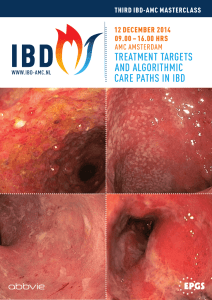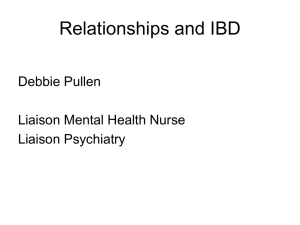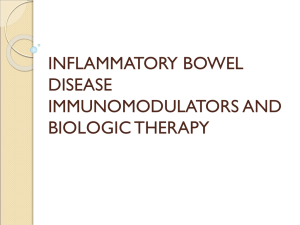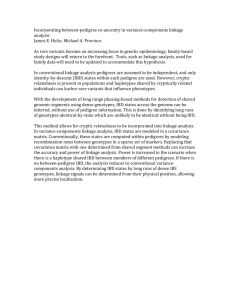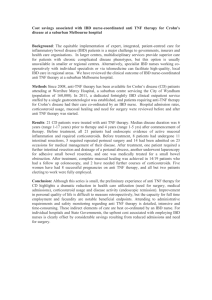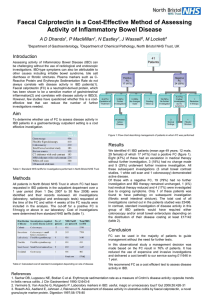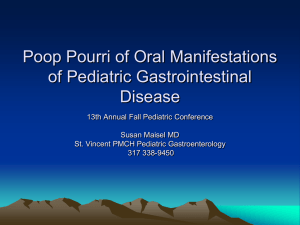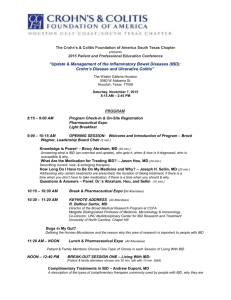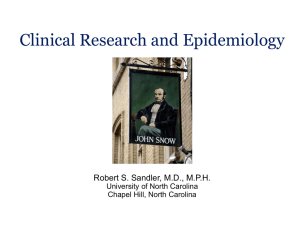1713-fpr-sorensen
advertisement
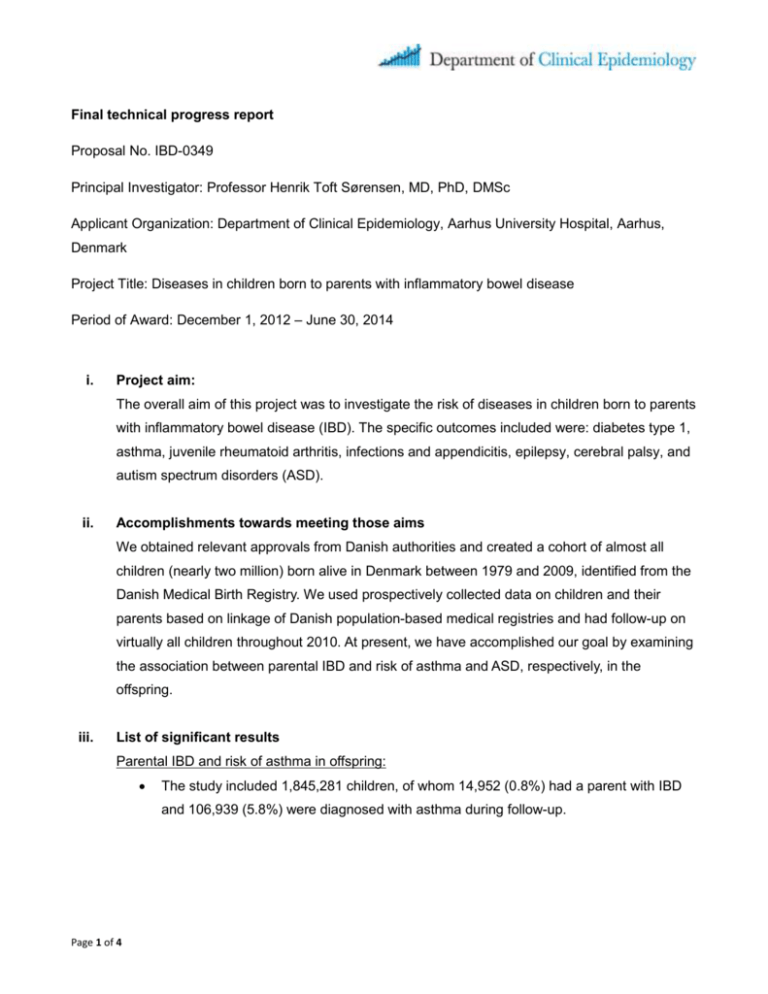
Final technical progress report Proposal No. IBD-0349 Principal Investigator: Professor Henrik Toft Sørensen, MD, PhD, DMSc Applicant Organization: Department of Clinical Epidemiology, Aarhus University Hospital, Aarhus, Denmark Project Title: Diseases in children born to parents with inflammatory bowel disease Period of Award: December 1, 2012 – June 30, 2014 i. Project aim: The overall aim of this project was to investigate the risk of diseases in children born to parents with inflammatory bowel disease (IBD). The specific outcomes included were: diabetes type 1, asthma, juvenile rheumatoid arthritis, infections and appendicitis, epilepsy, cerebral palsy, and autism spectrum disorders (ASD). ii. Accomplishments towards meeting those aims We obtained relevant approvals from Danish authorities and created a cohort of almost all children (nearly two million) born alive in Denmark between 1979 and 2009, identified from the Danish Medical Birth Registry. We used prospectively collected data on children and their parents based on linkage of Danish population-based medical registries and had follow-up on virtually all children throughout 2010. At present, we have accomplished our goal by examining the association between parental IBD and risk of asthma and ASD, respectively, in the offspring. iii. List of significant results Parental IBD and risk of asthma in offspring: The study included 1,845,281 children, of whom 14,952 (0.8%) had a parent with IBD and 106,939 (5.8%) were diagnosed with asthma during follow-up. Page 1 of 4 The 10-year risk of asthma was 6.9% among offspring of parents with Crohn’s disease, 5.6% among offspring of parents with ulcerative colitis, and 5.0% among offspring of parents without IBD. We observed no association between parental IBD and asthma in offspring (incidence rate ratio=0.98, 95% confidence interval (CI): 0.91–1.04). Results were similar regardless of parent of IBD origin or whether a parent had Crohn’s disease or ulcerative colitis. Results were also similar regardless of the definition of asthma (e.g. asthma defined by I) a hospital diagnosis of asthma or II) a hospital diagnosis and/or use of asthma medication). Parental IBD and risk of ASD in offspring: The study included 1,005,330 children. Among them, 11,888 (1.2%) had a parent with IBD and 8,087 (0.8%) had a diagnosis of ASD during follow-up. The 10-year risks of ASD were 0.7% among children of parents with IBD and 0.9% among children of parents without IBD. We observed no association between parental IBD and asthma in offspring (incidence rate ratio=0.8, 95% CI: 0.6–1.0) and results were similar regardless of parent of IBD origin or whether a parent had Crohn’s disease or ulcerative colitis. iv. The estimates were similar for different ASD subtypes. List of publications resulting from the project: Andersen ABT, Ehrenstein V, Erichsen R, Frøslev T, Sørensen HT. Parental inflammatory bowel disease and risk of asthma in offspring: a nationwide cohort study in Denmark. Clinical and Translational Gastroenterology. 2013 Aug 22;4. Andersen ABT, Ehrenstein V, Erichsen R, Frøslev T, Sørensen HT. Autism spectrum disorders in children of parents with inflammatory bowel disease – a nationwide cohort study in Denmark. Clinical and Experimental Gastroenterology. 2014 May:7 Both papers have been submitted to the BMRP. Page 2 of 4 v. Disclosure and description of any patents resulting in whole or in part from the project: N/A vi. A list of applications submitted to other granting agencies to continue work on the project, including the outcome of those proposals: N/A vii. Lay summary The impact of inflammatory bowel disease (IBD) and its management on fertility and pregnancy is an important consideration for patients in childbearing age and for clinicians. From the moment of conception, an organism’s physiological characteristics are being defined by the conditions in which it is growing, and thus factors related to embryonic and foetal life affect postnatal health. As susceptibility to many diseases could, at least partially, be determined inutero, studies with long-term follow-up beginning as close to conception as possible are required. Malnutrition, which occurs in up to 85% of all IBD patients, genetic predisposition, shared environmental risk factors, disease activity/inflammation, and medical treatment, may cause long-term health consequences in children of parents with IBD. Still, little is known about the association between parental IBD and long-term health in children. By means of funding from the Broad Medical Research Program, we used an epidemiological approach to examine the association between parental IBD and diseases in offspring. We have conducted two registry-based nationwide cohort studies in Denmark including nearly two million children born between 1979 and 2009. We have successfully examined the association between parental IBD and asthma and autism spectrum disorders (ASD), respectively, in offspring. Both studies have demonstrated that parental IBD is not associated with either asthma or ASD in offspring. In both studies, these null findings were consistent regardless of parent of origin or whether a parent had Crohn’s disease or ulcerative colitis. Reproduction is a fundamental part of human life. Since IBD usually has its onset in young people and thereby affects both men and women in their reproductive years, family planning is Page 3 of 4 a frequent topic of discussion between the gastroenterologist and the IBD patient. The findings of our project offer reassuring evidence to IBD patients regarding reproduction. Page 4 of 4
